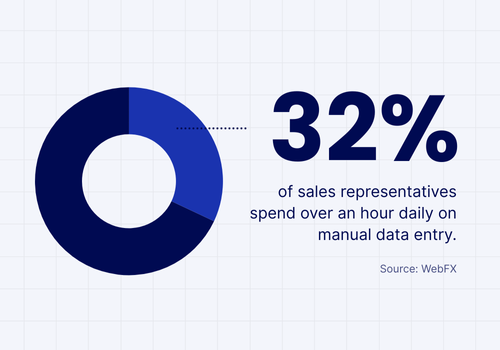The 7-Step CRM Audit You Need To Increase Sales

Dustin Parkes

You’re behind the wheel of a Ferrari F1 at Monza.
The crowd’s roaring, the track’s wide open, and you’re crawling along like it’s pick-up time at Maplewood Heights Elementary.
This is how too many businesses treat their CRMs.
In most cases, the fix isn’t a new system; it’s taking a hard look at the one you’ve already got.
A CRM audit is a structured review of how your system is set up, how it’s used, and how well it’s supporting your revenue goals.
It’s not about checking boxes. It’s about finding the gaps that cost you deals and fixing them before they grow.

At Hypelocal, we’ve seen organizations completely turn their pipelines around by using audits to uncover hidden inefficiencies, strengthen automation, and align sales and marketing around the same playbook.
When done right, this process transforms your CRM from a static database into a tool that moves opportunities forward.
Here’s how to run one that makes an immediate difference.
1. Revisit Your Original Implementation & Objectives
Before diving into the details, go back to the moment your CRM was first implemented or migrated. Pull up any setup documentation, workflow charts, or project notes.
What were the original goals?
Which processes were supposed to be automated?
What key metrics were meant to guide your strategy?
Evaluating these initial benchmarks helps you see where the system has drifted, and whether those changes were intentional or just the result of day-to-day workarounds.
Big Takeaway: An effective audit starts with the original blueprint. Without it, you’re fixing symptoms without addressing root causes.
2. Assess Your CRM Data Quality
No amount of automation can save a CRM weighed down by bad data.
During this second stage of the audit, check every aspect of your database for:
- Accuracy – Are fields consistent and correct?
- Completeness – Are all required data points being captured at every lead stage?
- Relevance – Are you storing information that actually drives decisions?
- Uniqueness – Are duplicates slowing things down?
- Timeliness – Are updates made promptly after each interaction?
Cleaning and standardizing your data allows you to move toward better segmentation, targeted outreach, and reliable reporting.
Big Takeaway: A clean CRM is the foundation for accurate reporting and meaningful automation.
3. Review Team Usage & Adoption
Even the best-configured CRM won’t help if it’s not fully adopted.
Review how sales, marketing, and customer success teams are using the system day to day.
Are they:
- Logging every meeting, call, and email?
- Using task reminders and scheduling features?
- Segmenting leads for more focused follow-up?
- Sharing notes and collaborating on the same records?
You may discover powerful features going unused, either because teams don’t know they exist or because current workflows make them inconvenient.
Big Takeaway: A CRM delivers value when it becomes the central place from which your entire team works.
Pro Tip: If CRM upkeep is being ignored because it’s too tedious, learn how AI can be used to automate manual processes to make CRMs more efficient.

4. Check for Compliance Alignment
Privacy regulations like GDPR and CCPA aren’t static. Your CRM processes shouldn’t be either.
Review your lead capture forms, consent tracking, and data storage against current laws in every region where you operate.
Beyond avoiding potential penalties, this step protects the trust you’ve built with customers.
Big Takeaway: Compliance is part of maintaining credibility and keeping the door open for future sales.
5. Audit Your Integrations
Every tool connected to your CRM—email platforms, marketing automation systems, accounting software—should make work faster and smoother.
Over time, integrations can break, slow down, or create duplicate records.
Review each one to confirm it’s working as intended, and streamline where possible. Often, a single smart integration can replace multiple manual steps.
Big Takeaway: If you think of your CRM as a hub, integrations are the spokes. Weak connections will slow the whole wheel.
6. Evaluate CRM Reporting
Reports are what turn raw CRM entries into informed decisions.
Check whether your current dashboards and scheduled reports give teams the information they need without manual data wrangling.
Sales activity, pipeline, and forecast reports should be both accurate and actionable. That means it needs to show where to focus effort, not just where things stand.
Big Takeaway: Good reporting isn’t just a summary of the past. It provides analysis that takes businesses to the next move.
7. Document Insights & Prioritize Action Items
Without a clear plan, audit insights end up as notes in a spreadsheet somewhere that no one acts on.
To make your findings actionable, categorize them into:
- Immediate fixes – urgent issues and quick wins.
- Short-term actions – changes you can roll out quickly with minimal coordination.
- Long-term projects – initiatives that need planning, resources, or phased execution.
This makes the audit manageable and ensures improvements actually happen.

Big Takeaway: An audit is a starting point, not a one-off task. The real value comes from acting on what you find.
Turning Your Audit Into Action
A thorough CRM audit doesn’t just tidy up records. It streamlines processes, sharpens automation, and makes every interaction with prospects and customers more purposeful.
At Hypelocal, we’ve helped businesses use these audits to pinpoint hidden opportunities, eliminate wasted effort, and set up automations so that every sales opportunity is capitalized on as fast as possible.
The better your CRM works for you, the less you’ll spend chasing leads, and the more time you’ll spend converting them.
You may also like

Using AI for Content Creation? Here are 3 Ways To Keep It Authentic
Learn how to use AI in content creation without losing authenticity—practical tips to increase quality, efficiency, and brand voice.

The Secret to Generating More Demand? Start with Market Analysis
Drive profitable demand generation with a thorough market analysis. Learn how to evaluate trends, competition, and customers.


